State
of Small Business Survey Report
April 2021



April 2021


Ahead of the Holyrood elections – taking place against an unprecedented economic and business backdrop – we wanted to know how Scotland’s small businesses are feeling, what they’re planning to do, and what the next Scottish Government needs to address if it’s to deliver economic recovery.
We hope these findings, based on responses from 698 small businesses, will inform, not just the election debate, but one of the most important legislative programmes a new government will ever have to set out.
1 in 4 expect to employ more people in the next year
57% think Covid has made self-employment less attractive
Top Issues for Business:
Access to broadband at 88% & Health and wellbeing 87%
Half of business owners say COVID-19 is a barrier to business success
The environment is important to the majority of small businesses (58%)
Only 1 in 5 believe the Scottish Government values the achievements of people running their own business
Most are optimistic about the future of their own business (56%) but a minority are optimistic about the future of small businesses in Scotland (22%)
83% agree government should intervene to help businesses and sectors in difficulty
Reducing business costs is top priority for investment to help recovery (51%) closely followed by help to create jobs (36%) and dealing with empty property in town centres (32%)
Access to broadband and health and wellbeing were regarded as the most important issues to small businesses, while the current state of the economy and Covid-19 were the biggest barriers to business growth.
Common business problems, such as transport and access to finance were, perhaps surprisingly, further down the rankings of importance, with the environment placed higher than both these issues.
However, while some issues may not feature highly for the majority of small businesses, they are, nevertheless, critical for some firms.
We asked small businesses to indicate which issues were important to them, as well as highlighting barriers to business success.
There was both some consistency and some divergence on which issues are most important to the small business community in Scotland. The vast majority of respondents rated “access to broadband” (88%) and their own “health and wellbeing” (87%) as essential or very important, and around two thirds (68%) rated “a successful local economy” and “digital and technology skills” in the same way. It is also notable that “the environment” (58%) ranked in the top five of important issues for firms.
However, some issues were seen as essential or very important by a minority of small businesses, including “access to finance and credit” (34%), “employee rights and pay” (43%) and “business support” (44%). The fact that access to finance and credit ranked bottom for small firms, in terms of importance, is surprising considering SMEs in Scotland have now accumulated approximately £3.3bn of new debt as a result of Bounce Back loans and Coronavirus Business Interruption loans.
Figure 1.1: “How important are each of these issues for your business?”
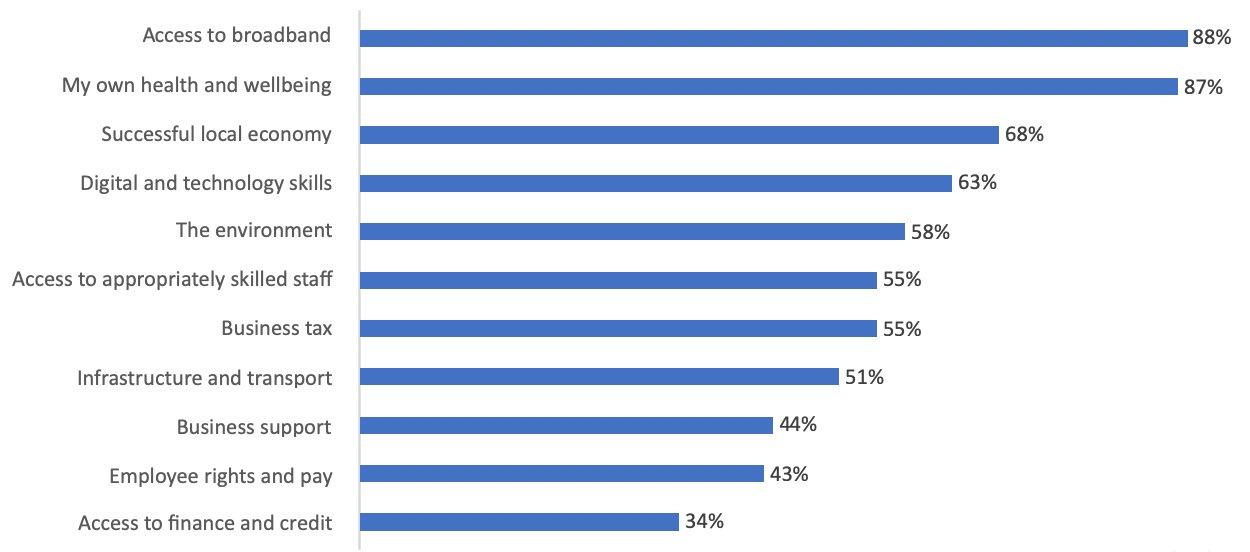
Base: All respondents (668)
In addition to issues that businesses regarded as important, we also asked about obstacles to the success of the firm. Given the timing of the survey in autumn 2020, during the Covid-19 pandemic and with uncertainty around a Brexit deal, it is unsurprising that both of these are key issues cited by small business owners as among the top three most important obstacles to growth. Around half (52%) of small business owners believe the current state of the economy is a barrier to growth, while just under a third cited Brexit (30%).
Covid-19 is regarded as a barrier to growth for half (50%) of small businesses, which, while surprising, likely reveals the uneven impact of the crisis on the small business sector.
Figure 1.2: “Which of these issues, if any, do you see as barriers or obstacles to the growth of your business?”

Base: All (666)
Surprisingly, a number of common business issues were not ranked highly as barriers to business growth. One explanation is that some policies have mitigated the effect of these obstacles. For example, the Small Business Bonus Scheme continues to ensure that a majority of small businesses pay no business rates. This may explain why firms rank this issue as a lower priority (13%). Similarly, the roll-out of superfast broadband has delivered better digital connectivity, in addition to improved 3G and 4G connectivity, which helps explain the lower ranking of this issue as a barrier (12%). That said, as seen in Figure 1.1 above, access to broadband remains the top priority for small businesses.
While some issues were only cited as a barrier to growth by a small number of businesses, nevertheless they are critical to those firms. We asked businesses about the impact of removing their chosen barriers, revealing that some of these issues may be more fundamental to business success than others. For example, for those who cited access to finance as a barrier, resolving this problem would have the greatest positive impact overall for the firm (88%).
We also asked small businesses about their core markets. This revealed that the majority sell to their local/ regional areas (57%), while around half sell across Scotland and the UK (49%), and around a third serve international markets (33%). However, the local/regional market was most likely to be reported as the most important market, with only 13% regarding international markets as most important.

Small businesses strongly believe government should intervene to support struggling sectors and businesses.
Most small businesses believe that businesses have a responsibility to keep as many employees in work as possible, but many feel this is not financially possible.
Seven months on from the onset of the Covid-19 crisis, we asked businesses to consider the role and responsibilities of government and business in the pandemic.
Almost all small business owners in Scotland believe that individuals need to play their part in guiding economic recovery (90%). However, three quarters (76%) believe government has the greatest role to play in helping businesses recover from the pandemic, while a large majority (83%) agree with the statement that government should intervene to help businesses and sectors in difficulty.
Disappointingly, a fifth of small businesses (22%) do not believe that the Scottish Government consider them as crucial to the country’s efforts to economically recover from Covid-19 – suggesting that the next Scottish Government will need to improve their standing with local businesses. This underlines why the next Scottish Government should send a strong signal to small businesses that they will be placed at the heart of recovery.
Figure 2.1: “Thinking about the response to the Covid-19 pandemic, to what extent do you agree or disagree with the following statements?”

As indicated in the previous section, Covid-19 is rated as one of the biggest barriers to business growth, with half (50%) of business owners feeling the impact of the current pandemic. Interestingly, those who cite Covid-19 as a barrier for business growth are more likely to believe government should intervene in the economy to support struggling sectors and businesses (88%).
Figure 2.2: “Thinking about the response to the Covid-19 pandemic, to what extent do you agree or disagree with the following statements?”

The majority of small businesses are optimistic about the future of their own business.
However, even the most optimistic firms are pessimistic about the outlook for small businesses in Scotland and the Scottish economy as a whole.
In the midst of the Covid-19 crisis last autumn, we wanted to understand more about small business’ views about the future.
This revealed significantly differing views about the outlook for business and the wider economy in Scotland over the next five years. While the majority of small business owners are – quite surprisingly - very or fairly optimistic about their own enterprise (57%), optimism falls away the wider the perspective of the economy is taken.
As illustrated in Figure 3.1 below, optimism falls to 45% when considering the relevant sector/industry. Optimism declines yet further for the small business sector as a whole (23%) and the Scottish economy (16%) over the next five years, perhaps further underlining how undervalued the small business sector feels.
That is why we have suggested not only that the next Scottish Government needs to change how it operates to better support small businesses, but that it sends a strong signal of support to the sector by introducing a Small Business Recovery Act.
Figure 3.1: “Broadly, how optimistic or pessimistic are you about the next five years in terms of:”

Base: All respondents (680)
As highlighted above, half of small businesses indicate that Covid-19 is a barrier to business growth.
Perhaps predictably, those who cite Covid-19 as a barrier to the growth of their business are less likely to be optimistic about their business (48%), and the sector/industry their business is in (39%).
However, irrespective of being affected by Covid-19, this group sees the same levels of drop off in optimism for the small business sector as a whole and the Scottish economy.
Figure 3.2: “Broadly, how optimistic or pessimistic are you about the next five years, in terms of:”
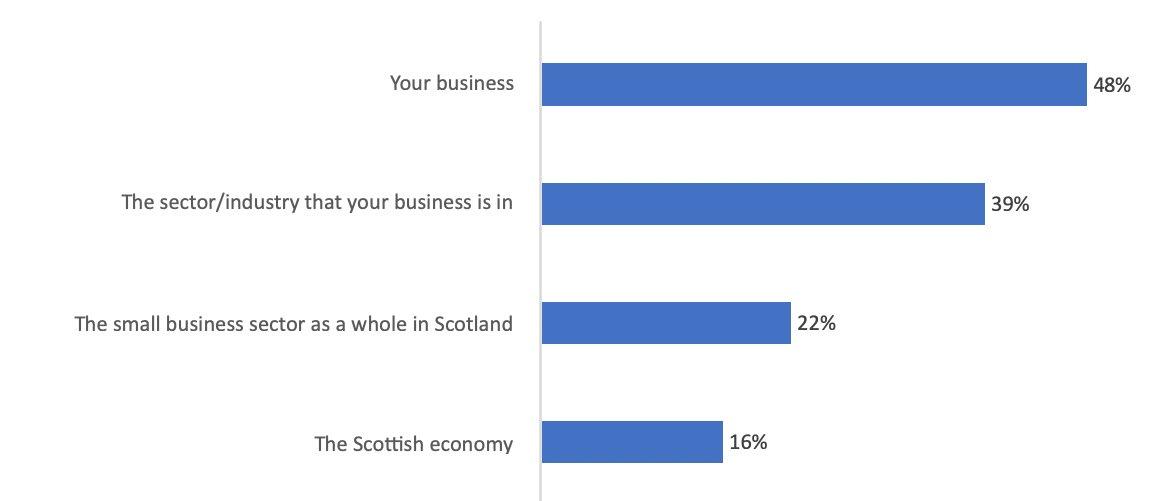
Base: Covid as a barrier to business (330)
Small businesses want to see investment that gives them breathing space to recover, with reducing costs a priority.
They are also firmly in support of investment in job creation and local town centres, as well as improving digital infrastructure/skills and the wider education system. Surprisingly, relatively few businesses suggest investment in either national or local transport as a priority for recovery.
Just over half of businesses have had to access finance as a result of the Covid crisis yet this has not necessarily harmed their intention to invest in their business in coming years.
While most small businesses believe they have a role in supporting climate change targets, most do not know what this means for their business; suggesting that most small businesses need a lot more support if they are to benefit from the green recovery.

When considering their top three priorities for future investment to aid recovery, reducing the cost of doing business (for example, overheads such as rent or other bills) tops the list for half of small business owners (51%). Schemes to help create jobs (36%) and renovate empty units in town centres (32%) also rank highly on the list of priorities for investment – findings that bode well for the recovery of local economies and their jobs markets. The breadth of investment priorities is shown in Figure 4.1 below.
Figure
4.1:
“…which of these issues, if any, do you think should be the priorities for investment to boost recovery?”

Base: All (648)
However, some issues were less likely to be prioritised for investment by the small business community. Indeed, it is perhaps surprising that investment in national and local transport projects (11% and 9% respectively) rank in the bottom three, given previously strong views on the need for greater funding for transport improvement schemes, such as local road developments. Likewise, because many more businesses have had to run their operations from home due to Covid-19 restrictions, it is surprising that few identify support to enable more home-working (12%).
Around half of small business owners have accessed finance to manage cashflow (53%) as a result of the Covid-19 pandemic. When asked if this would make business owners more likely or less likely to invest in their business, encouragingly, three out of five business owners are still likely to do so over the next few years.
Figure 4.2: “As a result of accessing finance to deal with cashflow during the pandemic, does this make you more or less likely to invest in your business in the next few years?”
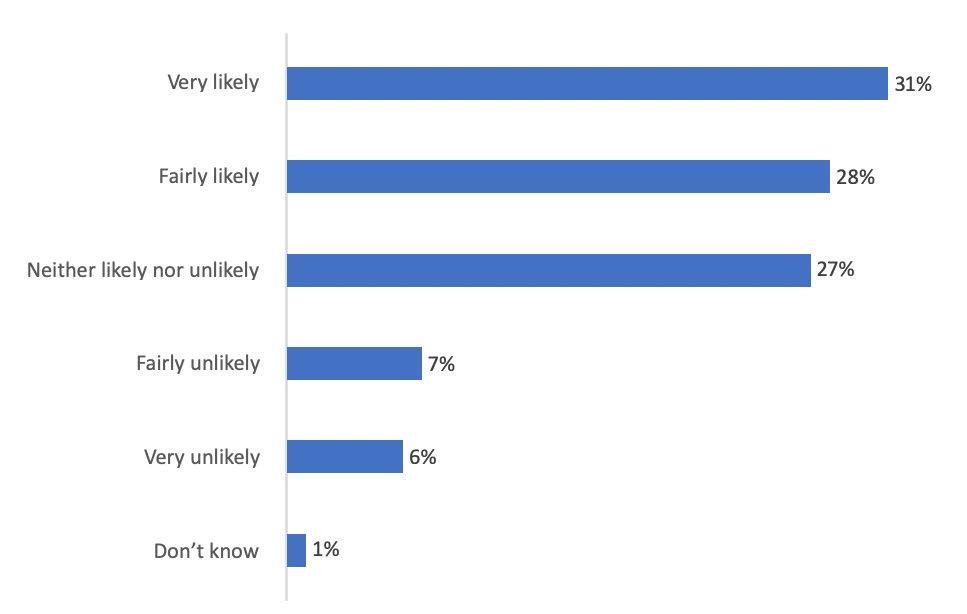
In the remainder of the chapter those referred to as ‘likely to invest’ are those who have both accessed finance as a result of the Covid-19 pandemic and are fairly or very likely to invest in their business over the next few years.
Overall, a third (34%) of small business owners believe access to finance and credit is an essential or very important issue to their business. There is a difference between those who have accessed finance, and those who have not, in relation to the overall importance of access to finance as an important issue, with 44% of small owners who have accessed finance believing it to be an essential or very important issue to their business. However, half (50%) of those who are likely to invest, and who have used finance, believe access to finance or credit is an essential or very important issue.

Figure 4.3: “How important is [access to finance and credit] to your business?"

Base: Those who are likely to invest given access to finance (204)
We also wanted to consider whether those likely to invest approached market expansion differently. Over half of small businesses do not expect to be expanding into new markets (53%). However, among small businesses which are likely to invest in the next 12 months, a higher proportion are likely to expand into new markets in the coming year (45%).
Figure 4.4: “Are you considering expanding into new market areas in the next 12 months?”

Base: All (646); Likely to invest (204)
Likely to invest
All respondents
The Scottish Government has outlined its objective of a green recovery, with a focus on investment to help Scotland achieve its climate change targets. This transition to net zero will require substantial change and investment from government, citizens and business. However, with many small businesses likely to be focused on survival and recovery in the short-to-medium term, they are likely to need far more support to adapt.
Positively, as previously highlighted in Figure 1.1, the environment is regarded as an essential or very important issue for a majority of small business owners (58%). Similarly, as seen in Figure 4.5 below, a significant majority of around three quarters (73%) of small business owners agree that small businesses have a responsibility to help achieve climate change targets. This rises to 82% for those who cited the environment as important.
Figure 4.5: “To what extent do you agree or disagree with the following statements about the environment?”

However, when considering where the responsibility for achieving climate change targets lies, just under half of small business owners believe this should be up to government (42%), and not small business owners.
Only one third feel they know enough about the Scottish Government policy on the environment to know how it will impact their business (33%). Further, only one in five small business owners agree with the statement they need to do a lot more to help Scotland achieve climate change targets (20%), perhaps suggesting that most small businesses underestimate the scale of change likely to affect all parts of society in coming years.
As a result, we have suggested the Scottish Government needs to think carefully about how it plans investment in measures designed to reduce emissions. Developing plans on a neighbourhood or community level will help the involvement of small businesses, ensuring they are able both to reduce their own emissions and create jobs arising from local investment.
People who work for themselves feel undervalued by the Scottish Government and believe large businesses are treated more favourably.
Most small businesses think Covid has made working for yourself less attractive.
The vast majority believe businesses have a responsibility to keep as many staff in jobs as possible.
However, only around a quarter of small businesses expect to take on more staff in a year’s time.
This crisis has exposed the risks taken by those who choose to set up their own business. Without access to sick pay and other benefits, it is unsurprising that only 8% of small business owners agreed that the selfemployed have more or less the same rights and benefits as employees. Given the uncertain future of many small businesses; the burden of additional debt; decisions to be made about the livelihood of employees and worries about the impact on personal and family incomes, it is no surprise at all that throughout this crisis small business owners frequently talk about the toll on their own mental health.
Perhaps unusually in a business survey, health and wellbeing ranked as one of the most important issues for firms, with over half regarding their own health and wellbeing as essential (58%).
Figure 5.1: “How important [is this] issue [own health and wellbeing] for your business?”
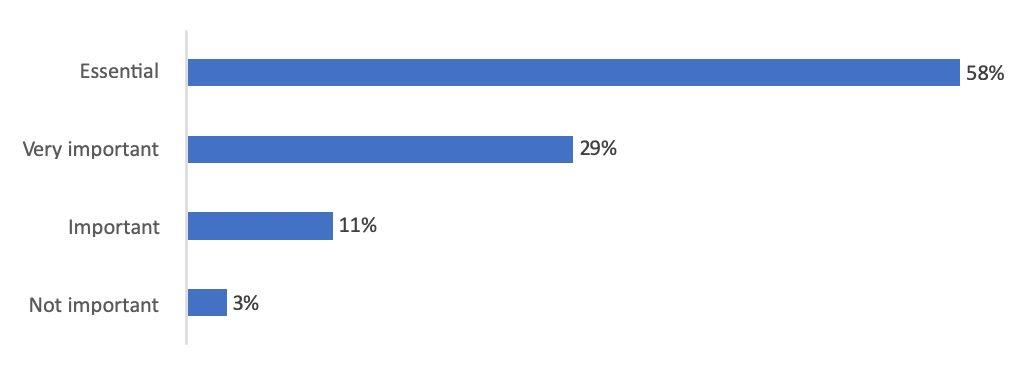
Base: All (668)
When thinking about self-employment in Scotland, two thirds believe self-employed businesses are treated less favourably than larger businesses (66%). Further, only one in five self-employed small business owners believe the Scottish Government values the achievements of those that run their own business (22%), as shown in Figure 5.2 below. This further underlines the crisis in small business confidence discussed in section 3.
Figure 5.2: “Thinking about self-employment in Scotland, to what extent do you agree or disagree with the following statements.”
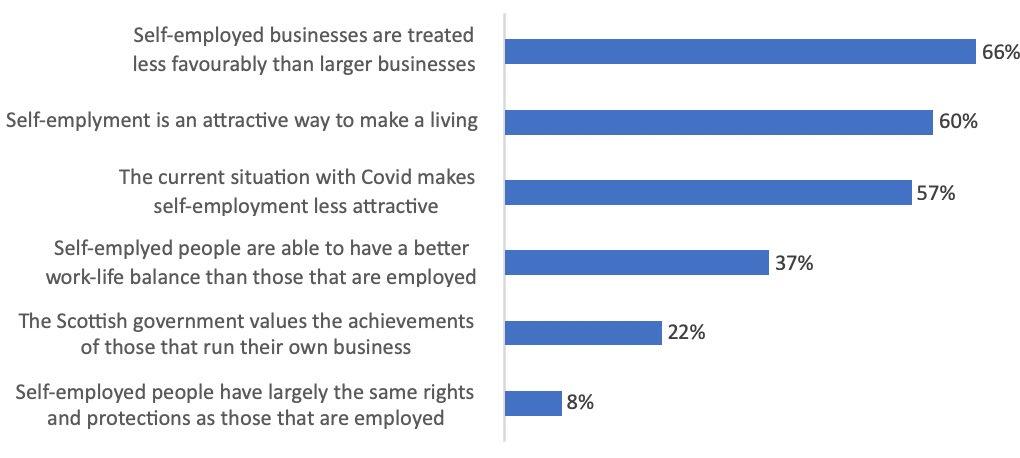
Base: All (589)
However, despite these setbacks nearly two thirds of small business owners agree that self-employment is an attractive way to make a living (60%). Surprisingly, as it is often cited as one of the benefits of working for yourself, only a little over a third (37%) of small business owners believe self-employment offers a better work-life balance.
We explored further the motivation for starting a business and this revealed that, by some margin, the main reason for starting a business related to enjoyment and passion in the relevant field (56%), followed by the ability to control work patterns (48%). Indeed, fewer than half cited making money as the motivation for starting a business (44%).
Figure 5.3: “Looking at the list below what are the two main motivations for you personally in running your business? Please select up to two”

Base: All (698)
The Covid crisis has meant many self-employed individuals have found themselves in an extremely vulnerable situation. For example, many have missed out on government support altogether, including finding themselves ineligible for Universal Credit. Given this vulnerability, it is perhaps unsurprising that over half agree that the current situation with Covid-19 makes self-employment less attractive (57%), while only one fifth disagree (19%).

Figure 5.4: Covid-19 and self-employment
However, those who are optimistic about their business for the next five years are also more in favour of selfemployment. Two thirds (65%) of those in the optimistic cohort believe self-employment is an attractive way to make a living.
Figure 5.5: Thinking about self-employment in Scotland, to what extent do you agree or disagree with the following statements.

Base: Optimistic (329) Base:
Small businesses power our local economies and we need more, not fewer, of them. This crisis has exposed how precarious it can be to strike out on your own. While risk is a natural part of entrepreneurship, we can do more to protect over 300,000 people in Scotland who work for themselves. While the Scottish Government has limited direct powers in this space, it could pilot new approaches to increasing the safety net for our selfemployed community.
We know from existing evidence that SMEs are a crucial source of jobs for those who have been unemployed and/or distant from the labour market. Indeed, 9 out of 10 people who move from long term unemployment into the labour market, do so by either working for themselves or working for a small business.
Given the anticipated job losses associated with the crisis, we wanted to understand more about small business’ appetite and capacity to create new jobs. Overall, most small businesses appear to be relatively resilient thus far, with around three quarters of small business owners expecting to employ more, or about the same number, of staff in a year’s time (74%) and only 16% expecting to employ fewer staff.
Figure 5.6: “Do you think you will employ more staff, fewer staff, or around the same number of staff 12 months from now?”

Base: All (629)
However, those who believe Covid-19 is an issue for their business are less optimistic. Two thirds believe they will employ more, or around the same number, of staff in a year’s time (67%). Indeed, as Figure 5.7 highlights, one in five small business owners who have experienced issues relating to Covid-19 expect to employ fewer staff within the next year.
Figure 5.7: “Do you think you will employ more staff, fewer staff, or around the same number of staff 12 months from now?”, given Covid-19 is an issue to business

Base: Those who identify Covid-19 as an issue for their business (309)
Perhaps unsurprisingly, those who are likely to invest in their business are notably more optimistic about creating jobs in the future. Three quarters of business owners (77%) who are likely to invest believe they will employ around the same number or more staff in 12 months from now, though of this 37% expect to employ more staff, compared to 24% of businesses overall.
Figure 5.8: “Do you think you will employ more staff, fewer staff, or around the same number of staff 12 months from now?”, given likely to invest in business

We believe that the last economic crisis from 2008 demonstrated the strong track record of small businesses in retaining and increasing staff. Again, when considering if businesses have a responsibility to keep as many employees in work as possible most small business owners are in agreement, as shown in Figure 5.9.
Figure 5.9: “Thinking about the response to the Covid-19 pandemic, to what extent do you agree or disagree with the following statements?”

Given the relatively small group of businesses that expect to recruit more staff in the coming year, we wanted to know more about what measures would support small businesses to retain and recruit staff.
Respondents were split in their opinions on the factors which would encourage them to employ more staff. Ultimately, demand will drive business expansion, as a quarter believe increasing demand in their sector would encourage them to retain or take on more staff (24%). Thinking about one of the main interventions open to government, one in five believe wage subsidies would aid their efforts to create jobs (21%). However, around a fifth of respondents would not be encouraged to retain or take on more staff irrespective of the help offered by government (17%).
Figure 5.10: “What would be the single most important measure that the Scottish government could take that would encourage you to retain or take on more staff?”

Base: All (625)

The survey questionnaire was designed by Diffley Partnership and signed-off by FSB. The survey was scripted on the “Survey Monkey” tool and issued online, via a unique link to respondents. It was issued to small business owners in Scotland and was open to both members of the FSB and non-members. A total of 698 responses were received from businesses in Scotland; the breakdown between members and nonmembers is shown in Table 1.1 below.
FSB members
Non-members
Scotland 475 223
Members were contacted directly, via email, and a sample of non-members was selected using records held by Dun & Bradstreet. To ensure broad coverage of the small business sector in Scotland businesses were selected on both their size and sector.
The fieldwork was conducted online between 29th September – 23rd October 2020. A number of reminders to non-responders were issued during this time.
The survey findings indicate the prevalence of views and experiences in answer to the survey questions. Where percentages do not sum to 100%, this may be due to rounding, the exclusion of ‘Don’t Know’ categories, or multiple answers. Aggregate percentages (for example “satisfied/not satisfied”) are calculated from the absolute values. Therefore, aggregate percentages may differ from the sum of the individual scores due to rounding of percentage totals. Throughout the report, an asterisk (*) denotes any value of less than half a percent and a dash (-) denotes zero.
Answers to open-ended questions are analysed and reported thematically. This data is qualitative in nature and therefore it is not appropriate to draw conclusions from this type of data about the prevalence of particular views or experiences but rather to indicate the range of different views expressed by respondents.
As you may know, there are elections to the Scottish Parliament in May 2021. The voice of small business will be vital in those elections and the Federation of Small Businesses (FSB) want to hear from you about your experiences and priorities for the future.
FSB has commissioned the independent research agency, Mark Diffley Consultancy and Research, to undertake a survey of small businesses to understand your views further. We would be really grateful if you could take around 10 minutes to answer this short questionnaire and have your voice heard.
In line with good research practice, we can assure you that the answers you give to the survey are confidential and will not be seen outside the research team.
Q1. First, looking at the list below what are the two main motivations for you personally in running your business?
RANDOMISE ORDER (SELECT UP TO 2)
• To make money
• To contribute to my community/fulfil a wider objective
• It gives me control over my work patterns (I like being my own boss)
• I can work with family and/or friends
• I work in an interesting field/am passionate about what I do
• I like inventing/innovating new ways of doing things
• Something else (Write in)
• DK (Single Code)
Q2. Broadly, how optimistic or pessimistic are you about the next five years in terms of:
• Your business
• The sector/industry that your business is in
• The small business sector as a whole in Scotland
• The Scottish economy
SCALE: Very optimistic, fairly optimistic, neither optimistic nor pessimistic, fairly pessimistic, very pessimistic, DK
Q3. Looking at the list below, how important is each of these issues for your business?
RANDOMISE ORDER
• Access to broadband
• Business tax
• Access to appropriately skilled staff
• Digital and technology skills
• Access to finance and credit
• Employee rights and pay
• Infrastructure and Transport
• The environment
• Business support
• Successful local economy
• My own health and wellbeing
SCALE: Essential, Very important, Important, Not important, DK
Q4. Looking at the list below, which of these issues, if any, do you see as barriers or obstacles to the growth of your business? Please select up to three which you see as the most important barriers
RANDOMISE ORDER (SELECT UP TO 3)
- The current state of the economy
- Cash-flow
- Competition in the market
- Overheads (e.g. cost of rent and utilities)
- Water costs
- Tax and tax compliance
- Regulation and enforcement
- Business Rates
- Access to affordable finance
- Shortage of skilled staff
- Availability/cost of suitable premises
- Transport issues
- Broadband and mobile connectivity (e.g. 4G)
- Issues related to exporting/importing
- Crime (including cyber-crime)
- Brexit
- Covid
- Something else (WRITE IN)
- None of these (Single code)
Q5. And, thinking of the issues you selected, if the Scottish government improved each of them, what impact, if any, would that have on your business?
SCALE: A large positive impact, a somewhat positive impact, no impact, DK
Q6. Thinking about the response to the Covid pandemic, to what extent do you agree or disagree with the following statements?
• Government has the greatest role to play in helping businesses recover from the pandemic
• Businesses have a responsibility to keep as many employees in work as possible
• I would like the business to keep more employees in jobs but it is not financially possible to do so
• Government should intervene in the economy to support struggling sectors and businesses
• The Scottish government believes that small businesses will play a crucial role in the recovery from the current economic crisis?
• Individuals need to play their part in helping the economy recover from the pandemic
SCALE: Strongly agree, tend to agree, neither/nor, tend to disagree, strongly disagree, DK, NA
Q7. Looking at the list below, which of these issues, if any, do you think should be the priorities for investment to boost recovery? Please select up to three which you see as the most important.
- Improving digital infrastructure and skills
- Providing support to enable more home working
- Renovation/re-purpose of empty units in town centres
- Helping businesses to invest in making premises more energy-efficient
- Scrappage scheme for investment in electric vehicles
- Large-scale national transport projects
- Local transport projects
- Skills investment for those already in work
- Schemes to help create jobs
Reducing the cost of doing business (e.g. business rates)
- Encouraging more business start ups
- Improving the education system
- Something else (WRITE IN)
- None of these (SINGLE CODE)
Q8. Moving on, thinking about where you supply your products or services; which of the following applies to your business?
SELECT ALL THAT APPLY
• Supply to local area/region
• Supply across Scotland
• Supply across the UK
• Supply internationally
Q9. And which is the most important to your business:
SINGLE CODE ONLY
• Local area/region
• Across Scotland
• Across the UK
• Internationally
Q10. Are you considering expanding into new market areas in the next 12 months?
SCALE: Yes/No, DK
RANDOMISE ORDER OF Q11 AND Q12
Q11. Thinking about the product or service you provide, to what extent, if at all, does it matter that it is branded as being ‘Scottish’ ?
SCALE: It matters a great deal, it matters a little, it doesn’t matter very much, it doesn’t matter at all. DK, NA
Q12. Thinking about the product or service you provide, to what extent, if at all, does it matter that it is branded as being ‘British’ ?
SCALE: It matters a great deal, it matters a little, it doesn’t matter very much, it doesn’t matter at all. DK, NA
Q13. Moving on, in the last 12 months, have you accessed/attempted to access finance to manage cashflow as a result of the Covid pandemic?
SCALE: Yes have accessed finance, attempted to access finance but not successful, No, DK
ASK IF HAVE ACCESSED FINANCE AS A RESULT OF THE PANDEMIC
Q14. As a result of accessing finance to deal with cashflow during the pandemic, does this make you more or less likely to invest in your business in the next few years?
SCALE: Very likely, fairly likely, neither/nor, fairly unlikely, very unlikely, DK
ASK ALL
Q15. And what one measure do you think Scottish government could introduce to encourage you to invest more in your business
WRITE IN BELOW
Q16. Thinking about tax, to what extent do you agree or disagree with the following statements?
• Business taxes should be the same regardless of whether a business has physical premises or operates entirely online,
• I think that the level of taxes on small business in Scotland is about right
• I support the idea of the “polluter pays principle”, where businesses which cause harm to society have to pay more tax,
• The government should use tax breaks to help create incentives for growth and investment
• The government is entitled to place conditions on certain types of businesses that receive tax breaks
SCALE: Strongly agree, tend to agree, neither/nor, tend to disagree, strongly disagree, DK
Q17. At the moment, decisions about business tax, business support services and business regulation are made by both the Scottish government and local authorities. Thinking about each of these issues, do you think the current mix of decision making between Scottish government and local authorities is about right, should be more focussed on decisions being made by Scottish government or should be more focussed on decisions being made by local authorities?
RANDOMISE ORDER
• Decisions about the regulation of small business
• Decisions about business taxes
• Decisions about business support services
SCALE: About right, would prefer more focus on decisions being made by Scottish government, would prefer more focus on decisions being made by local authorities, DK
Q18. Moving on, do you think you will employ more staff, fewer staff or about the same number of staff in 12 months from now
SINGLE CODE ONLY
• More staff
• Fewer staff
• About the same number of staff
• DK Q19. Looking at the list below, what would be the single most important measure that the Scottish government could take that would encourage you to retain or take on more staff?
SINGLE CODE ONLY, RANDOMISE ORDER
• Increased grants for apprenticeships
• Wage subsidies
• Access to appropriate talent and skills
• HR/Admin support
• Increasing demand in my sector
• Reducing regulatory barriers
• Support from larger businesses (e.g. mentoring)
• Nothing
• SOMETHING ELSE (WRITE IN)
Q20. Thinking about different procedures and policies which some small businesses have in place and others do not; which of the following do you currently have in place in your business?
TICK ALL THAT APPLY
• Encouraging diversity and inclusion (for example proactively recruiting staff from minority backgrounds such as people from minority ethnic backgrounds or people with disabilities)
• Formal voice for employees (for example staff representatives, forums or surveys)
• Flexible working (for example working from home policies)
• Adaptations for staff with disabilities (for example flexible working policies)
• Flexibility for employees with caring commitments
• A plan for pay and progression (for example staff performance reviews)
Q21. Thinking about the policies that you do not currently have in place in your business, what are the main reasons for not having them?
TICK ALL THAT APPLY
• It would cost too much
• I do not think we need it
• I had not considered these policies before now
• It would take too much time
• It would not/could not apply to my business (for example we do not employ staff)
• It’s a low priority
Q22. Moving on, to what extent do you agree or disagree with the following statements about the environment?
SINGLE CODE ONLY RANDOMISE ORDER
• I feel I know enough about the Scottish government policy on climate change to know how it will impact on my business,
• It should be up to government, and not small businesses, to make sure that climate change targets are achieved,
• Small businesses have a responsibility to help achieve climate change targets,
• My business needs to do a lot more to help Scotland achieve climate change targets,
• The environment policy of the Scottish government ignores the needs of small businesses
• Introducing new legislation on climate change at this time will harm the financial position on my business
SCALE: Strongly agree, tend to agree, neither/nor, tend to disagree, strongly disagree, DK
Q23. And what one measure do you think Scottish government could introduce to encourage your business to become more environmentally friendly/reduce its impact on the environment? WRITE IN BELOW
Q24. Moving on, thinking about self-employment in Scotland, to what extent do you agree or disagree with the following statements
• Self-employed people have largely the same rights and protections as those that are employed
• Self-employment is an attractive way to make a living
• The Scottish government values the achievements of those that run their own business
• Self-employed businesses are treated less favourably than larger businesses
• The current situation with Covid makes self-employment less attractive
• Self-employed people are able to have a better work-life balance than those that are employed
SCALE: Strongly agree, tend to agree, neither/nor, tend to disagree, strongly disagree, DK
Ask to All
Q25. Finally, thinking about the next Scottish election in May 2021, which of the following comes closest to your view
Primarily I choose how to vote based on my own personal views OR
Primarily I choose how to vote based on what is best for my business OR
I choose how to vote based equally
fsb.org.uk facebook.com/federationofsmallbusinesses
@FSB_Scotland
If you require this document in an alternative format please email accessability@fsb.org.uk